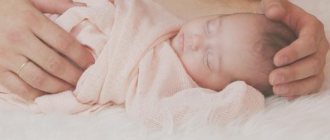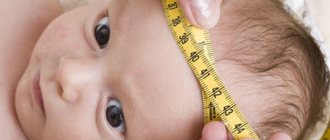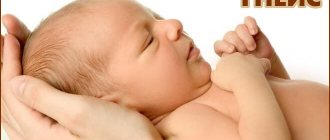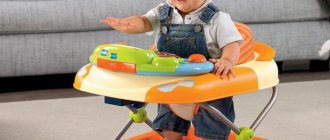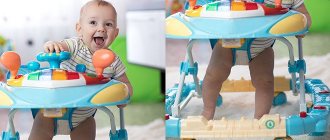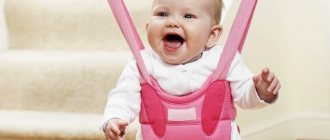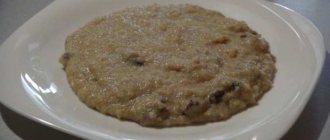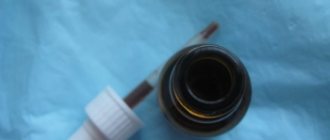Sweat secretion mechanism
Sweating is an integral process in the functioning of our body. It is thanks to the work of the sweat glands that thermoregulation is carried out. In addition, this phenomenon helps remove waste and toxins from the body, participates in the acid-salt balance and performs a barrier function, protecting the body from bacteria entering it through the skin. The secretion of fluid through the skin is carried out by two types of sweat glands. We are talking about eccrine and apocrine elements.
Types of glands responsible for sweat excretion:
- Apocrine glands are present on the human body from birth. They are quite large and located only in certain areas. The functions of these elements are still not fully understood. However, it is known that such glands secrete pheromones and begin to work during puberty.
- Eccrine glands are also present in every person from birth. These elements are small in size and cover the entire body. However, there are areas where their concentration is especially high. It is these glands that are responsible for thermoregulation, and also participate in acid-base metabolism, protecting the body from bacteria and removing toxins.
Typically, sweating occurs precisely due to the increased activity of the eccrine glands. However, in some cases, this problem becomes a consequence of failures in the apocrine system.
Is sweat normal, or what can your baby’s body tell you?
Want to know why your baby sweats while sleeping? If we speak in simple words (about seemingly complex things), then the whole point is that in the human body everything is so interconnected that even sweat can tell us quite a lot about human health.
We immediately draw your attention to the fact that sweat itself is just a signal from our body, so in most cases, parents (maybe you are one of them?) worry completely in vain.
Babies can often sweat in their sleep when they are simply hot, worried, overexcited, or sick.
But their system is not yet as perfect as ours, and the body, as best it can, copes with situations that are not yet standard for it. Yes, yes, exactly, through sweating.
We will talk about specific reasons below: when to remain calm and when to be more attentive.
Excessive sweating as a symptom
In order not to start the disease, which is accompanied by profuse sweating, it is important to detect it in time and begin treatment. Let's find out what may be hiding behind the innocent beads of sweat in a child. Fortunately, dangerous diseases, in addition to sweating, have other pronounced signs by which they are easy to recognize.
One of these diseases is rickets. Night sweats are not the main symptom of the disease. First of all, the following symptoms are alarming:
- loss of appetite;
- frequent constipation;
- baldness of the occipital part of the head;
- restless and anxious sleep;
- the child becomes too fearful;
- The baby's sweat, like urine, acquires an unpleasant sour smell.
In diabetes, the head and neck become heavily moisturized during sleep. At the same time, other parts of the body are completely dry. Also, the child drinks a lot often, the urge to urinate becomes more frequent, and the baby feels hungry all the time.
If you have problems with the heart and vascular system, weight loss, coughing, and rapid breathing are added to sweating.
Hyperhidrosis may be caused by a nervous system disorder. At the same time, the sweat smells sharp and unpleasant and appears only on some parts of the body. The consistency of moisture is watery-liquid or thick and sticky.
After 4 months, when the child begins to put everything in his mouth, he may become infected with worms. Parasites that poison the body with the products of their vital activity provoke decreased immunity, increased sweating, weakness, and tearfulness.
At 3 years old, the head is moistened during sleep with lymphatic diathesis, but it is not considered a disease and requires not so much treatment as prevention: bathing with a decoction of herbs, restrictions on the consumption of sweets. In summer, it is useful to give fruits (except citrus fruits) and vegetables instead of juices.
Often, only a pediatrician can answer the question of why a child’s head sweats heavily during sleep. To exclude diseases, consult a doctor. Especially in cases where other symptoms listed above are present.
Attention! Cold sweat may occur in a sleeping child after vaccination. If sweating after vaccination is accompanied by redness or paleness of the skin, shortness of breath, this may indicate the development of complications and an allergic reaction. In such a situation, you should immediately call a doctor.
Why does sweating during sleep not disappear by 3–4 years of age?
As a rule, by the age of 3–4 years, the child’s head sweats less and less during sleep, and the main reason for this is the matured nervous system.
But even during this period, you can encounter this phenomenon, which, as at an earlier age, can cause discomfort to the baby.
Therefore, you should understand the reasons that caused the problem and eliminate them. So, a 3-4 year old baby’s head sweats heavily during sleep due to the fact that:
- Overweight is observed.
- The baby is suffering from tuberculosis.
- There are problems with the heart and blood vessels.
- There is treatment that involves the use of medications over a long period.
- The baby is in a state of stress.
- Lymphatic diathesis was revealed. If such a diagnosis is established, then the child should be limited in sweets and citrus fruits, and the diet should be filled with seasonal vegetables and fruits to the maximum.
Daily bathing is mandatory, during which the use of cosmetics is prohibited. They should be replaced with herbal decoctions and sea salt.
What causes sweating in a newborn?
Quite often, a newborn will sweat profusely during sleep. There is an explanation for this.
The thing is that the baby’s nervous system is responsible for this process, which at this period of his life is not perfect and cannot fully perform its functions. Therefore, such a phenomenon as a wet head is quite normal.
In addition to the immaturity of the nervous system, you can encounter this problem if:
- The baby is overheated.
- The body has not yet recovered from a recent cold.
- The baby is in a state of overexcitation, accompanied by crying and moodiness.
- Hereditary sweating.
Does your child's head sweat a lot during sleep? Let's figure it out together!
A lot has been said about the main reasons why a child may sweat in his sleep. But even this information is sometimes not enough for anxious parents who want to know whether it is normal for a child to sweat too much during sleep, and what could be causing this to happen.
- Let's start with the fact that very often even an adult can sweat a lot if he starts to get sick with some kind of viral infection. Remember yourself during the cold season - weakness, throwing you either hot or cold. Likewise, a child may sweat a lot if he has already caught the virus, but is not yet completely sick.
- All caring mothers (I have no doubt that you are one of them) carefully ensure that the child is fed and happy. But sometimes even the most sensitive parent can forget that water is no less important for the baby. If you see that your child sweats a lot during sleep, try to increase fluid intake, in case it is the lack of water that is causing your problem.
We recommend reading: Finger exercises for children from birth to 6 months
All of the above reasons are not dangerous, provided that sweating is not accompanied by any additional symptoms. A healthy child should not have such unpleasant symptoms as trembling hands, fainting, pale skin, and the like. In such cases, you should not rely only on yourself; consult the doctor who is seeing your child at the clinic.
What if your baby starts sweating while feeding?
Indeed, very often mothers of newborns pay attention to the fact that the child’s head sweats not only during sleep, but also when breastfeeding. It would seem that the baby is quite calm - he may have almost fallen asleep, but if we run over his head - and the palm remains wet, is it normal to sweat when feeding?
You know? In fact, it only seems so to us that he does nothing, slowly sucks milk and rests. At this time, the child is undergoing active processes - in order to feed himself, such a small person needs to make a lot of effort.
In addition, it has already been proven that sweating in newborns and children in the first year of life is like a protective system that protects the brain from overheating.
Sometimes when feeding, the baby may sweat a lot if the mother has little milk or breastfeeding is coming to an end - the baby is growing and needs breast milk less and less.
Causes of sweating depending on age
Why does an infant's head sweat?
A child 1 year of age or younger constantly has a sweaty head for various reasons. If a baby's head sweats in moderate amounts, then this condition should not cause concern among parents, since it is the norm. If the head is constantly sweaty and the infant suffers from other symptoms, then you should consult a doctor. A one-year-old child sweats in the head area for the following reasons:
- lack of vitamin D;
- cardiac disorders;
- thyroid abnormalities;
- colds;
- side effect of drug therapy;
- genetic disorders;
- phenylketonuria;
- signs of cystic fibrosis;
- lymphatic diathesis.
If a baby's sweat is thick and sticky, this may indicate disturbances in the central nervous system. In this case, a month-old baby needs the help of a pediatrician or neurologist.
Breastfeeding is one of the reasons for a baby's head to sweat.
Another reason for head sweating in a newborn is feeding. Often, when breastfeeding, drops appear on the forehead of a month-old baby, which should not cause alarm. This is due to the fact that the baby eats, he has to physically strain a lot to “get” milk. The baby sweats especially quickly if he is in his mother’s arms during feeding. A child at 7-9 months of age sweats in his head during sleep due to physical activity.
Sweating in children from 2 to 4 years old
At 2 years old, the child sweats heavily on the back of the head and face due to too warm clothes, stale air in the nursery, or failure to maintain suitable humidity in the room. Sweating can also occur after a cold with fever. At the age of 3, sweating is usually associated with an allergy to bedding or synthetic pajamas, and increased sweating in the head area can occur with lymphatic diathesis. At the age of 4 and in older children, the back of the head often sweats due to the following factors:
- excess weight;
- impaired vascular function;
- long-term drug therapy;
- tuberculous lesion.
Teenage sweating of the head: main sources
Poor diet contributes to sweating of the head.
Often during adolescence, periods of increased sweating of the head are noticed. A teenager’s head sweats day and night due to the following sources:
- Physiological factor. During this period, a hormonal imbalance occurs in the child’s body, causing increased sweating of the head.
- Increased activity. Teenage children are constantly on the move, go to various sports clubs, dances and spend a lot of time outdoors.
- Unbalanced diet. At this age, children do not always have time to eat normally, so they often make do with snacks, which negatively affect their health and become a source of sweating.
- Emotional turmoil. Teenagers often experience experiences, stress, and anxiety that increase the production of sweat, including on the head.
What factors cause the problem in children 1–2 years of age?
An older child becomes more independent, he moves more, which means that he gets pretty tired during the day. At this age, children begin to sleep more soundly.
But when sleep disturbances occur and the child’s head is very sweaty, due attention should be given to this condition, because it may indicate that the baby has:
- There are problems associated with heart and vascular diseases. In this case, sweating is reinforced by rapid breathing, sudden weight loss, and coughing.
- Diabetes. This disease is also recognized by symptoms such as regular sensations of thirst and hunger. The baby feels the urge to urinate more often than usual.
The appearance of sweat can be associated not only with the diseases mentioned above, but also with less serious reasons:
- Bad sleep (nightmares). Tension causes changes in the functioning of the nervous system.
- Ecology. Pollution of the environment in which a child constantly lives can lead to frequent vulnerability of the body to various types of diseases, manifested by high body temperature, chills, and increased sweating.
- Diseases that are infectious in nature.
Physiological
Why does a child sweat a lot when he sleeps, from a physiological point of view? The work of the sweat glands is the most standard function of regulating body temperature at any age. Also, when sweat leaves the body, it removes many harmful, toxic substances. In children, the perspiration process returns to normal only by the age of six. Therefore, if your baby still gets wet often, there is no need to worry right away. Perhaps the baby’s nervous system has not yet strengthened, or he was simply overheated in the sun.
Pathological
At night, the child sweats a lot due to the fact that during daylight hours he is more active, and during daytime sleep the liquid quickly evaporates due to a large waste of energy. Sometimes a child sweats heavily during sleep due to colds.
It happens that the disease occurs in a latent form, and mom and dad cannot immediately determine the cause.
In newborns and infants, the body is not at all adapted to the temperature of the external environment, and they can react violently to weather conditions. The development of diseases will occur if parents do not notice such signs as sticky sweat that has a characteristic odor, the child’s anxious state of health, the baby’s shuddering while falling asleep and other painful symptoms. If you recognize your little one's behavior in any of these areas, consult a doctor immediately.
What is associated with increased sweat production:
- heart problems;
- lack of vitamin D (rickets);
- vegetative-vascular dystonia;
- apnea (holding your breath during sleep);
- problems with the immune system and thyroid gland;
- colds;
- chronic diseases;
- allergic reaction to medications.
Causes of child sweating by age
The reasons for excessive sweating largely depend on the age of the children.
4-5 months
At 4 months the child already becomes active. He sleeps less and is more interested in the world around him. The abundance of impressions provokes increased work of the endocrine glands.
6 months
At six months, the baby begins to teethe. The child’s immunity decreases, and sweating is a symptom associated with an increase in temperature.
7-8 months
A 7 month old baby is sweating due to simple overwork. He played, moved actively and was tired. As a result, whims appeared, as a result of which the temples and the back of the head began to sweat.
9 months – 1 year
A down pillow or blanket may cause your baby to sweat. Products with fluff are too strong a heat attack, they provoke allergies, a symptom of which is sweating of the head.
2 years
The most common reason is warm clothing, an unventilated, stuffy room. The baby is still sweating after an illness accompanied by a high fever.
3 years
To the above reasons is added lymphatic diathesis, which disappears when all organs mature.
4 years
The causes of hyperhidrosis can be heavy weight and prolonged use of certain medications. Parents should not be afraid of excessive sweating of the baby. If you carefully observe the child, it will not be difficult to identify and neutralize the cause.
Why do children between 1 and 3 years old sweat?
The development of each child is a unique process. But most babies enter a period of active exploration of the world after the first year of life. The baby gets a lot of bright impressions. Some of them can cause negative emotions. They are the ones most often dreamed of by a one-year-old baby, and this makes his sleep disturbing, which leads to increased sweating.
USEFUL INFORMATION: Choking in your sleep: reasons for lack of air at night, why it’s hard to breathe
The formation of sweat during falling asleep is observed in children 1–2 years of age and older in cases where they are recovering from a cold. Sweating may also accompany sleep while taking medication, but as soon as the course is over, the problem should disappear.
Often the child’s head, neck, and area behind the ears become covered with sweat due to bedding materials that cause allergies in the baby. Therefore, you need to select underwear and pajamas only from natural fabrics, so it will be much easier for your baby to fall asleep. It is important to use down pillows and duvets with caution. In addition to the fact that down can contribute to the development of allergic reactions, it is also a very hot material, so it is not surprising if after such sleep the child finds himself wet with sweat.
Advice. It happens that the baby’s head sweats at night, but medical studies have not found any abnormalities in the baby’s health. This is probably a genetic predisposition. To make sure whether this is really the case, you can ask your relatives if they have had a similar problem.
Even if the neck and hair on the head become very moisturized during sleep, but the sweat does not have an unpleasant odor, you should not worry too much. This is natural for babies.
When should you not worry?
If a child’s head sweats profusely during sleep, and the pillow becomes wet in the morning, parents normalize the temperature in the bedroom and replace the bed linen:
- wool blanket - on bamboo;
- down pillow - to synthetic.
We recommend reading: Sleeping a baby with the breast: how to wean a baby from sleeping and sucking on the breast all the time?
If these measures have given results, and sweating has noticeably decreased, there is no need to worry. In addition, the absence of other symptoms (for example, weakness, increased thirst, heart rate fluctuations) also indicates a high probability that the child has no health problems.
In addition, in some cases the head sweats heavily during sleep due to the individual characteristics of the body. The sweat glands work more actively than normal, which explains the release of moisture. With age, the body rebuilds itself, although some adults also experience problems with severe sweating.
Warning Signs: Pay Attention to These
We have already emphasized that sweating should not cause your alarm if the discharge is colorless and odorless, if there are no other additional manifestations. Unfortunately, sometimes sweat can be a sign that your baby is having problems. Let's look at the most common options:
- Rickets. Yes, a lack of vitamin D can lead to this disease. Any mother, even without special medical education, can identify it if she notices that her sweaty little head clearly smells of something sour;
Another symptom is if not only the child’s head, but also the child’s face begins to sweat heavily, and if the baby’s sleep becomes restless. Sometimes rickets can be accompanied by digestive problems or loss of appetite.
- Neurological problems. This is often indicated by the fact that not only the head can sweat, but also the back, neck, and one palm. Pay attention to what kind of sweat - has it suddenly taken on a tint or become viscous? If this is the case, there is cause for concern, seek help;
- Hereditary diseases. Unfortunately, there are diseases that are inherited, in which the baby can also sweat a lot. These include cystic fibrosis and phenylketonuria.
Sometimes mothers of grown-up children wonder why a 3-year-old child sweats in his sleep. It would seem that the “newborn” problems are left behind, and during this time the baby’s body, to some extent, is already working smoothly and clearly. A three-year-old child may sweat profusely during sleep due to what is called lymphatic diathesis.
Under this frightening name lies a not so terrible phenomenon, which often appears due to the fact that individual organs seem to have not fully “ripened”.
If you follow simple rules of care, your child will quickly forget about this unpleasant period in his life. Daily baths, limiting sweets in food, replacing completely unhealthy juices with natural fruits and vegetables are perhaps the very first things that will help cope with diathesis.
Why do teenagers sweat?
Teenagers are also prone to sweating. This is explained by hormonal changes that occur during growing up. During puberty, a variety of processes occur inside a child. This is what leads to increased sweating.
Causes of hyperhidrosis during sleep during puberty:
- One of the reasons is the beginning of the functioning of the apocrine glands. At this age, they begin to work, secreting a fairly large amount of sweat at first;
- Also, a similar problem appears due to hormonal instability. Such disruptions lead to increased sweating;
- Another reason why teenagers sweat at night is constant stress and excitability of the nervous system. This is also associated with hormonal imbalances.
Increased production of sweat secretions at night does not always occur in adolescents. However, if hyperhidrosis is still present, it is often not a sign of the disease. Over time, this condition goes away on its own.
What it is?
Hyperhidrosis (from the Latin "hyper" - excess, "hydro" - water) - increased sweating. Mostly the feet, palms and armpits sweat (local hyperhidrosis), but in adolescents the scalp is actively involved in this process. It gets so involved that some children’s hair begins to resemble sad, sticky icicles. In complex cases, episodes of sweating of the head are only a partial manifestation of general hyperhidrosis, in which the whole body sweats profusely.
The active process of sweating begins at the slightest excitement . The child, knowing about the upcoming test, sweats so “severely” that drops of sweat from his head drip straight into the notebook. Often this becomes the cause of chronic psychological discomfort and many problems in communication (which we have already written about). Considering that children's society is very cruel, it may come down to the need for constant consultations with a professional psychologist.
The production of large amounts of sweat in patients with hyperhidrosis is not always associated even with physical activity and emotional experiences. Often an “attack” begins for no apparent reason. Very often the face also turns red (erythrophobia). Patients experience a number of accompanying symptoms – insomnia, emotional instability, constant stress. Hyperhidrosis is a disease for both boys and girls. It is believed that in the latter it occurs twice as often due to the fact that women are more susceptible to stress.
External factors causing sweating
Hyperhidrosis at night can cause not only serious diseases. Sometimes external factors lead to this problem. In this case, dealing with the problem will not be difficult. It is enough just to eliminate the negative factor.
Why does a child sweat excessively when falling asleep:
- One of the possible reasons is not the optimal temperature in the room. If this indicator exceeds 19-20 degrees, then sweating will be quite natural. Excessive dryness of the room can also lead to this;
- A child's sweating may occur as a result of dressing inappropriately for the season. Wearing synthetic pajamas and using synthetic bedding also leads to this problem;
- You should not ignore such a factor as poor nutrition. At the same time, overeating, improper selection of diet, and eating food immediately before bedtime can lead to hyperhidrosis;
- Poor personal hygiene can also lead to sweating;
- Nightmares and vivid dreams are another common cause of night sweats in children;
- Nervous disorders and stress can lead to night sweats.
The most dangerous diseases that cause sweating and their symptoms
Some diseases that manifest as excessive sweating are life-threatening. Moreover, they are most effectively treated precisely at the initial stages of their progression. Therefore, it is very important to know their symptoms.
The most dangerous diseases that cause sweating include diseases such as cancer, tuberculosis, sarcoidosis, pneumonia, etc. Some genetic pathologies that worsen the quality of life are also dangerous.
If such diseases are ignored for a long time, the patient’s condition worsens greatly. This ultimately leads to death. Therefore, it is very important to recognize them in time. There are several symptoms that are characteristic of secondary hyperhidrosis caused by disease.
Symptoms associated with sweating in serious diseases:
- Increased body temperature;
- Headache;
- Dizziness;
- Nausea and vomiting;
- Irritability;
- Decreased appetite;
- Sleep disturbance;
- Painful sensations.
If you have such symptoms, you should immediately consult a doctor. This will increase the chances of successful treatment.
Prevention
To avoid the problem of excessive sweating in a child, parents need to adhere to the following preventive measures:
- Try not to wrap up your child. Choose clothes for him made from natural materials, avoiding synthetics.
- Take care of a sufficient level of air humidity in the nursery, especially during the heating season. Dr. Komarovsky recommends regular ventilation of the room where the baby plays and sleeps. This measure will help humidify the air and improve the quality of your night's rest.
- Adjust the child's sleep and wakefulness patterns.
By following these simple rules, you can avoid the problem of sweating in your baby if he is healthy.
So, if in the dark the baby suffers from perspiration that covers his head, the cause of what is happening should be determined. Parents are advised to observe the baby for a while and eliminate all external factors that could lead to the problem of night sweats in their child.
If it does not go away, consult a doctor immediately. Only he will be able to diagnose the disease that gives this unpleasant symptom and prescribe medications that will help cure it.
When should you visit a doctor?
Children are the most susceptible to various negative factors, so it is very important to detect and eliminate them in time. Thus, it would be completely useful to visit a doctor if the child sweats a lot during sleep, but there are no accompanying symptoms.
Recommended reading: Books that are best to read before bed
However, there are some factors that indicate that it is simply necessary to contact a pediatrician. These include: constant sweating at night, the presence of other suspicious manifestations, and the absence of external negative influences.
Who should I contact?
If a child is sweating, then, first of all, it is necessary to contact a pediatrician. In this case it is a pediatrician. The specialist will examine the little patient. If any problems are identified, he will be prescribed a test for the biochemical and general composition of blood and urine. Based on these data, the doctor will be able to judge the condition of the body. Having received the results of the analysis and performed an examination, the pediatrician will be able to refer the child to a specialist. He may also be assigned variations of instrumental research. After this, an accurate diagnosis will be made.
Treatment
Parents worry and wonder what to do if their child’s head is constantly sweating.
If a disease is detected, follow the doctor’s instructions for taking medications, a balanced diet, daily routine and physical activity.
Folk remedies
Baths are usually used, especially when the disease is mild.
Bath daily without soap. The child's head is sweating a lot - a bath with the addition of a herbal decoction of chamomile or string will help. It will not hurt to add 1 tbsp of sea salt to the water. l. based on 10 liters. liquids. This bath is taken once a week.
Tips for parents
If a sleeping child's head sweats, he feels uncomfortable and fidgets a lot, you should not look for the cause on your own. Only a specialist will quickly and accurately identify it and, if necessary, prescribe treatment.
In cases where doctors have not found anything dangerous, you can listen to the recommendations of experienced mothers who will help make the baby’s life more comfortable:
- Make sure that the temperature in the room where the baby sleeps is optimal. If using a heater is necessary, choose models that do not dry out the air. Ventilate the room and do at least three wet wipes of furniture and floors per day.
- Often the baby's head sweats due to too warm clothes. Older children may open up in their sleep: this signals that the baby is hot. Choose clothes based on temperature conditions and do not wrap your child too warmly while sleeping.
- It is advisable to bathe your baby every day. It is worth using soap less often. It is better to add decoctions of medicinal herbs (several times a month you can use oak bark, chamomile, string, and less often sea salt).
- Food should not be salty or spicy. Sweets also cannot be given without restrictions. It will be useful to introduce vegetables and fruits into the diet according to age.
- A set of therapeutic exercises and massage will help improve your body’s health and boost your immunity.
Don't be alarmed if your child wakes up sweaty. The best way is to carefully monitor your child so as not to miss any other symptoms if they appear. Remember, timely consultation with a pediatrician will help avoid the development of dangerous diseases.
Sweating during feeding
It is not uncommon for a baby’s head to sweat during feeding. Sweating can be both a physiological process and a sign of pathology. In the first case, the reason for increased sweating is the same as in adults who feel hot after a heavy meal. The feeding process consumes energy, which is converted into heat, and the body is protected from overheating.
For a baby, the process of eating food is difficult and energy-consuming, and many young mothers overly wrap their children or keep the temperature in the apartment too high for fear that the child will catch a cold. To prevent the baby from experiencing discomfort and sweating during feeding, maintain the temperature at 18-20 degrees and do not dress him too warmly.
Pathological sweating during feeding is possible if the child has rickets (see above). In this case, sweating will not be the only symptom; it will be accompanied by anxiety, late teething, decreased muscle tone, slow growth and weight gain of the baby. Rickets is very easily diagnosed and treated with vitamin D supplements, sunbathing and a special diet (if the child’s age allows).
Advice from experienced mothers: how to avoid excessive sweating?
The child's head may begin to actively sweat due to uncomfortable clothing or incorrect temperature conditions. This makes it impossible to sleep normally, leads to a general weakening of the body due to lack of sleep, capricious behavior and other undesirable deviations.
Experienced mothers who have encountered a similar situation give the following recommendations:
- First of all, temperature plays an important role. The air in the bedroom should not be too dry and hot. Maintain room temperature within 18-22 degrees, and humidity - no higher than 60% (but not less than 50%).
- To prevent your child from sweating while sleeping, buy clothes only made from cotton and other natural materials.
- You shouldn't wrap yourself too tightly unless necessary. This prevents him from falling asleep normally.
- On hot days, it is better to visit swimming pools and cool down in other ways - at such times the risk of overheating is especially dangerous.
- It is worthwhile to massage regularly: gently stroke your legs, tummy, and arms. As they grow, the movements are intensified: a one-year-old child is only stroked, but at an older age the movements become more complicated. Massage increases blood flow, stimulates the heart, and has a beneficial effect on the nervous system and muscles.
If the measures taken do not produce results, and the child’s head continues to sweat in his sleep, seek help from doctors to determine the cause. Self-medication is not recommended, as there is a risk of harming the child’s health.
Advice from pediatrician Komarovsky
The famous children's pediatrician Evgeny Olegovich Komarovsky, explaining why a child's head sweats in a dream, gives the following reasons:
- High temperature in the bedroom.
- Synthetic bedding.
- Individual characteristics of the child. Associated with the functioning of the autonomic nervous system. Such physiological features disappear or remain with age, but both are options for the normal development of the body.
You should not pay attention to these factors. Only internal disorders in the body cause concern:
- rickets;
- dysfunction of the immune system;
- liver dysfunction;
- diseases of the digestive system, etc.
Thus, the fact that a child’s head sweats during sleep does not necessarily indicate internal disorders in the body. Such phenomena are caused by a violation of the temperature regime in the room and thick clothing made from non-natural materials. Parents should pay attention to these conditions and not wrap things up unnecessarily.
Main reasons
There can be many reasons why a child’s head sweats during sleep. Moreover, they depend on his age.
Therefore, when determining the factor contributing to the appearance of such a condition, this nuance must be taken into account. The main reasons why a sleeping baby sweats are:
- Lack of vitamin D in the body.
- Colds, flu.
- Heart failure.
- Disorders of the thyroid gland, leading to increased production of hormones.
- Taking medications, the side effects of which include increased sweating.
In order to provide the right help to the baby, it is necessary to find out why the child’s head sweats during sleep, because some of them are by no means safe.
For example, a lack of vitamin D in the body can lead to the development of rickets, which causes sleep disturbances in the newborn, moodiness, bad mood throughout the day, accompanied by constant crying.
Therefore, it is not worth taking any measures regarding the normalization of the child’s condition on your own, because the reasons that caused this condition may lie not only in disruption of the body’s functioning, but also in the action of other factors, in particular:
- Clothing that is not appropriate for the weather or temperature in the room.
- The room where the baby sleeps is very stuffy.
- High ambient humidity exceeding 60%.
Quite often, a child wakes up sweating if he falls asleep on a feather-filled pillow. This leads to overheating of the body and lack of skin breathing. All causes that contribute to profuse sweating must be eliminated.
